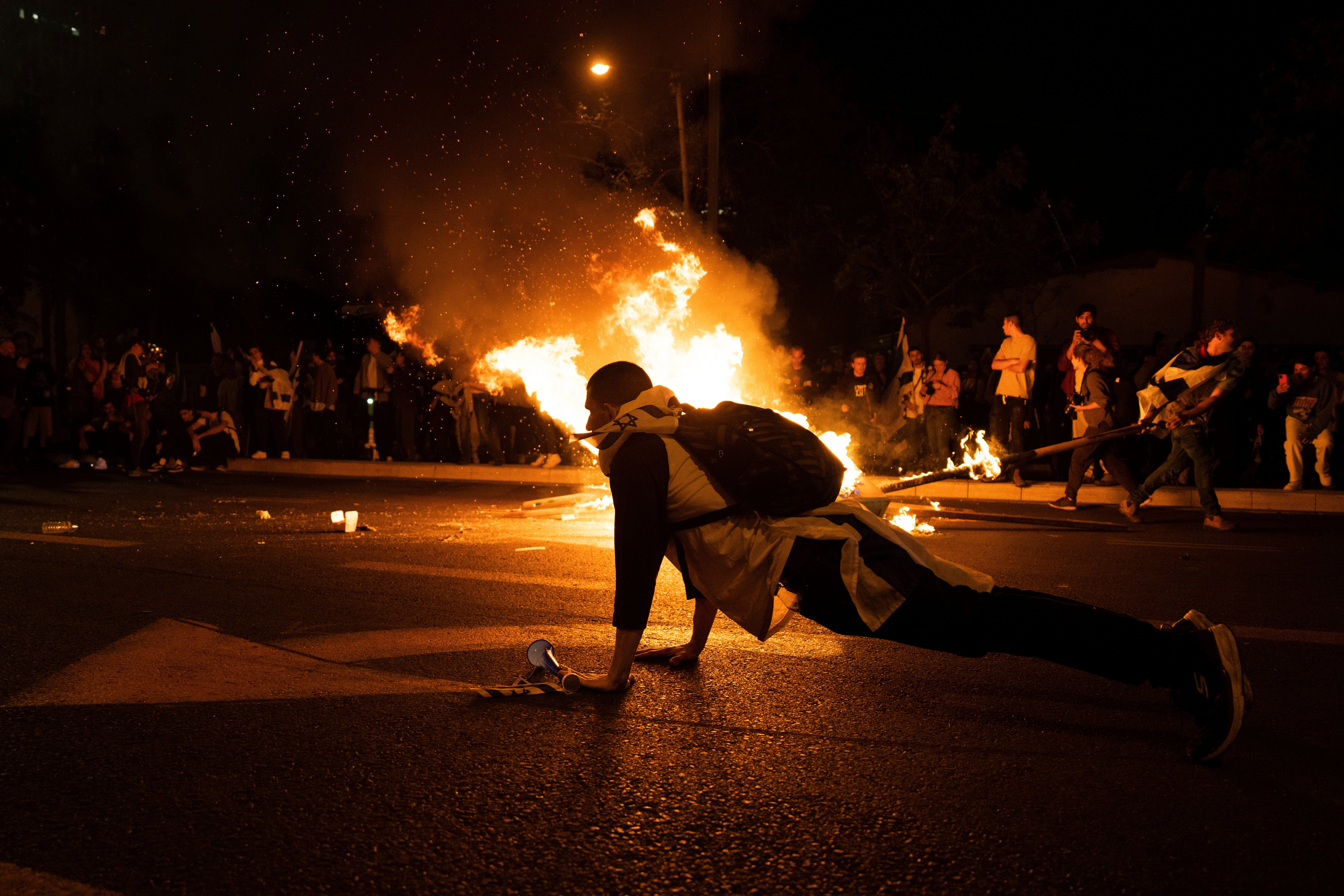
The political chaos that has engulfed Israel goes well beyond a bitter battle over controversial plans to potentially defang the country’s judiciary and the mass protests the proposals have sparked.
The root cause sits at the volcanic core of the country. It is the reason why there have been five elections in less than four years, and why some argue there may be a sixth on the horizon.
Israel is bitterly – maybe even irreparably – divided. And that identity crisis is coming to a head. And at least for now, there does not seem to be any way to marry what are vastly – existentially – different visions of how the state should run into something workable
On Monday, after tens of thousands of people demonstrated outside the parliament building in Jerusalem, the Israeli prime minister, Benjamin Netanyahu, announced he would temporarily freeze the plan to overhaul the judiciary. In a prime-time televised speech, Israel’s longest-serving premier said he would begin setting up negotiating teams, a move he said would “avoid civil war”.
In a nutshell, the government plan would give Mr Netanyahu, who is on trial on corruption charges (he denies the allegations) and his allies the final say in appointing the nation's judges. It would also give the parliament, which is currently controlled by his allies, the authority to overturn Supreme Court decisions with just a basic majority. It would limit the court's ability to review laws.
Critics say it would make it difficult to declare a prime minister unfit for office and is designed to protect Mr Netanyahu during his own legal proceedings.
Mr Netanyahu and his supporters say that is wrong, and that the changes will stop the courts encroaching and overreaching powers.
Israel is incredibly fractured at all levels but in simplistic terms right now on one side are the supporters of Mr Netanyahu and his coalition of far-right ultra-nationalist and religious parties. On the other side – at least at this juncture – is pretty much everyone else.

Attempts by Mr Netanyahu’s government to push through this judicial overhaul have widened the cracks both within his supporter base and with his opponents. Out of those cracks has erupted the angry demonstrations seen in recent weeks.
There appears to be no consensus anywhere, but if a “comprise” can be reached, what might it possibly look like?
A senior opposition source told me they believe they “have a responsibility to try” with the negotiations “but no one is under any illusions that it will be easy... There isn’t much trust in Netanyahu."
“The main issue is the protection of Israel’s democracy but the wider effect has been the galvanising of Israel’s liberal camp in response to an attack on its core values," the source added.
Dr Dahlia Scheindlin, a veteran Israeli pollster said that even within Mr Netanyahu’s ruling coalition there are “fundamentally different aims for what they want to accomplish”.
“Netanyahu protection is only part of it." She said, adding his allies want a more religious “illiberal” and “annexationist Israel”.
“The parties of the opposition, right now, want a fundamentally liberal democratic Israel.”
Adding to the confusion is the fact that the “opposition” is itself fractured. Those who have come out against the judicial overhaul include everyone from left-wing secular youth protesters to centre-right parties led by former members of the security establishment and now – according to some polls – alarmed supporters of Mr Netanyahu’s own Likud party.

Dr Scheindlin said that other than arriving at minor agreements over very specific aspects of the judicial programme, discussions over the proposals will probably result in just “another standstill”.
With even his own Likud party supporters divided over the judicial overhaul, pressure is building on Mr Netanyahu. Which is why he has been playing for time.
Rafi Smith, who for years has been the main pollster for Likud, told me he has not seen such low popularity ratings in five years: the party could potentially lose as many as five of the 32 seats it secured in last autumn’s elections if another vote was needed.
According to Mr Smith’s polls, Mr Netanyahu’s coalition has dipped below the razor-thin majority needed to hold on to power.
“They are losing seats to the centre parties… Most of the [the country] is between 54 to 60 per cent opposed to the judicial programme,” he said.
“It is a very deep conflict, society in Israel is very torn apart. It is deeper than only the judicial system," he added.
Even those who back the government’s plans have warned about the threat of division. Professor Avi Bell of Bar Ilan University's Faculty of Law has been very vocal in his support for Mr Netanyahu's reform package that he has called “long overdue and absolutely necessary”.
“The political crisis is only peripherally related to judicial reform,” he told me. “It is much more an issue of the changes in Israeli politics in recent years… Politics are more polarised and more extreme.” He said he believes that “a clash is inevitable.”
So, while the judiciary has been the flashpoint this time, there will be other fractures on the horizon. This identity crisis will persist, until the extreme polarisation in Israel ceases to exist. But that prospect appears remote.







